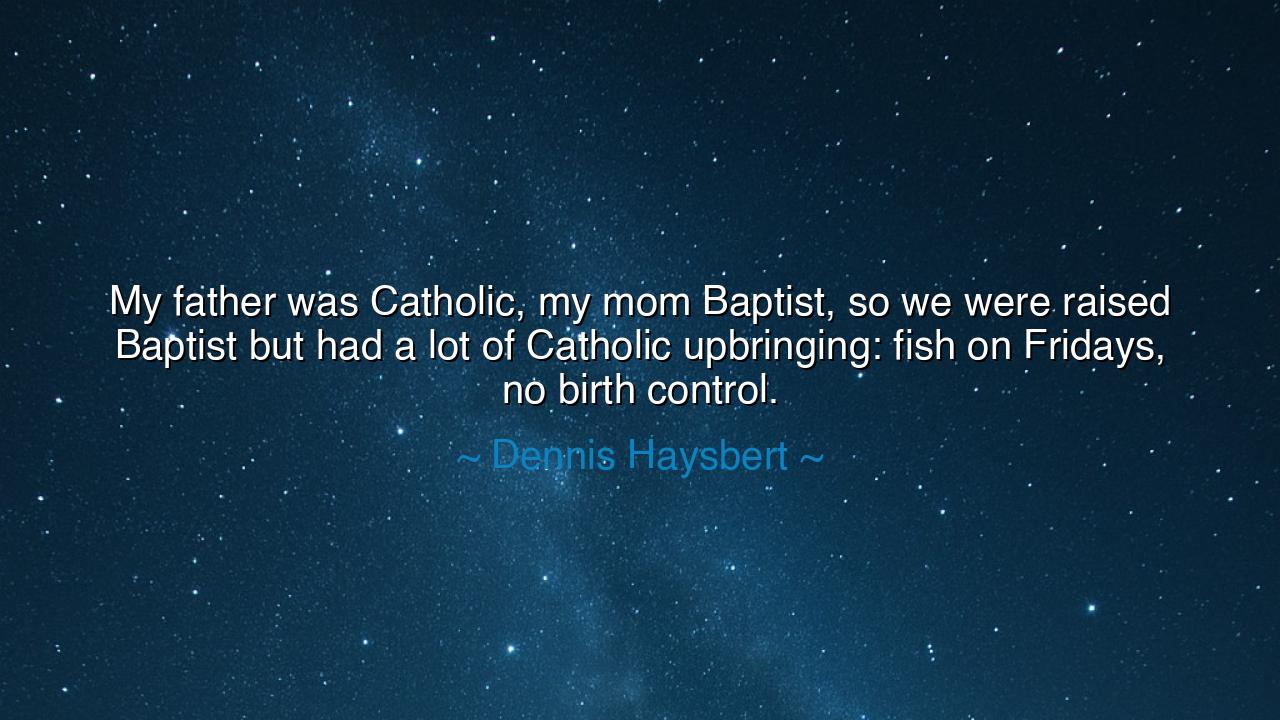
My father was Catholic, my mom Baptist, so we were raised Baptist
My father was Catholic, my mom Baptist, so we were raised Baptist but had a lot of Catholic upbringing: fish on Fridays, no birth control.






“My father was Catholic, my mom Baptist, so we were raised Baptist but had a lot of Catholic upbringing: fish on Fridays, no birth control.” — Dennis Haysbert
In this humble confession of Dennis Haysbert, there lies the story of many souls born between two faiths, two worlds, two traditions. His words are not a mere remembrance of childhood customs, but a mirror of humanity’s eternal struggle to reconcile belief and belonging, ritual and spirit, law and love. When he speaks of fish on Fridays and no birth control, he does not just describe practice, but reveals the invisible thread of faith that wove together his parents’ lives — different paths converging beneath the same sky of devotion. In his household, the divine was not one voice but a conversation, where Catholic reverence met Baptist fervor, and out of that meeting was born a life enriched by both.
The ancients would say that when the gods whisper from different temples, the wise listen to them all. So too does Haysbert’s upbringing teach us that truth may wear many garments, yet its heart remains one. The Catholic father, rooted in tradition and ritual, offered the structure, the rhythm, the sacred repetition that steadies the soul. The Baptist mother, alive with passion and song, offered the fire of testimony, the freedom of the spirit that leaps beyond the written word. Together they created a household where the sacred was both disciplined and alive — where Sunday hymns rose beside the scent of fried fish, and where faith was less a fence and more a bridge.
In ancient lands, such blending of faiths was seen as a mark of divine favor. When King Solomon took wisdom from Egypt and understanding from Israel, he built not only a temple of stone but a temple of the mind — one that could hold many voices in harmony. Likewise, Haysbert’s words speak of a sacred harmony, where contradiction becomes unity, and difference becomes depth. For what is faith, if not the art of seeking God in every corner of creation, even when those corners belong to different names and creeds?
There is tenderness in the image of “fish on Fridays” — a simple act that carries centuries of meaning. It speaks of obedience, of memory, of a people who remember sacrifice through sustenance. The child who eats the fish learns that even in daily bread, holiness can be found. And in “no birth control,” we hear not judgment, but the echo of an older discipline, a reverence for life’s cycles, a faith that saw fertility as sacred rather than burdened. Though times have changed, the lesson remains: what we practice shapes what we believe, and what we believe shapes who we become.
Yet this dual heritage is not without struggle. The one raised between traditions must learn balance — to honor both without losing the self. The ancients knew this as the path of the bridge-walker, those who move between worlds to bring understanding. In such people, the divine plants a seed of empathy, for they have seen how faith divides and how love heals. To live as Haysbert did is to carry the fire of difference without being burned by it, to learn from both altar and pulpit, and to find peace in the echoes of both prayers.
The story of his family reminds us of countless others who have walked similar paths — like the children of mixed heritage in the old empires, who grew fluent in the tongues of conqueror and native alike. One such was Marcus Aurelius, emperor and philosopher, born of Stoic reason yet ruling by Roman might. He wrote that the wise man learns from all schools but is enslaved by none. Haysbert’s life, too, reflects this: the capacity to carry two faiths in one heart, to be both grounded and free.
And so, the lesson to future generations is clear: do not fear the blending of traditions. Where two rivers meet, the waters grow stronger, not weaker. Let your heart be like the confluence — accepting, discerning, yet ever faithful to what is good. Eat your “fish on Fridays” if it reminds you of gratitude; sing your “Baptist hymns” if they awaken your spirit. But never forget that the divine cares less for the label of your faith than for the purity of your intention. Seek not the comfort of one path alone, but the wisdom that lies in walking between them.
Let this teaching echo in your homes: honor your mother’s song and your father’s silence; keep their rituals not as cages, but as candles. For faith, in all its forms, is meant to illuminate, not divide. And when you pass these ways to your children, let them know — as Haysbert knew — that they come from many fires, yet burn with one light.






AAdministratorAdministrator
Welcome, honored guests. Please leave a comment, we will respond soon